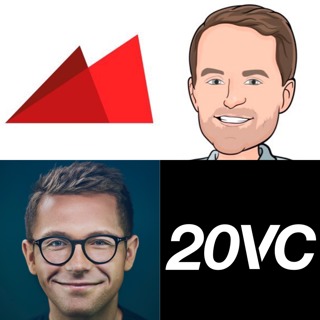
20VC: Is Now Really the Best Time to Be Investing? WTF is Happening at Growth Stage Investing? Why VCs Have Gotten Lazy Over the Last 2 Years? Investing Lessons from Hitting with Braze and Missing with Snowflake with Logan Bartlett, Managing Director @ Re
Logan Bartlett is a Managing Director @ Redpoint, a firm with a portfolio including the likes of Stripe, Nubank, Twilio, Netflix, Snowflake and many more incredible names. As for Logan, at Redpoint he has led investments in the likes of Ramp, Monte Carlo, Cribl, Crossbeam and Acuity MD to name a few. Before joining Redpoint, Logan spent over 5 years with the team at Battery where he made investments in Pendo, Amplitude, Dataiku, Braze and Kustomer. In Today's Episode with Logan Bartlett We Discuss: 1.) Entry into Venture: How Logan made his way into the world of venture joining Battery Ventures? What are 1-2 of Logan's biggest takeaways from his time with Battery? What does Logan know now that he wishes he had known when he started in venture? 2.) The Venture Landscape Today: Is now really the best time to be investing? How does Logan compare today to prior vintages? How does this differ when comparing consumer to B2B? How does Logan analyze the state of the growth market? Is anyone really doing deals today? If so, what is the discount on price vs last year? How do the public markets impact the later stage financings which have disappeared in the last 3 months? How do the later stage financings impact the early stage? Does Logan agree that "venture has never been less collaborative as it is today"? 3.) The Role of the Venture Investor: Why does Logan believe that VCs have gotten lazy over the last 2 years? Does Logan believe we will see even more GPs at the top retire in the downturn? How does Logan analyse his role as a board member today? How has his style changed over time? What is the single best board Logan is on? Why that one? Who is the best board member Logan works with? What makes this board member so good? How does Logan assess the importance of personal brand in venture today? Why does Logan believe no company should hire PR firms from the early days? 4.) Investing Style and Lessons: What has been Logan's single biggest hit as an investor? How did seeing that impact his mindset? What has been Logan's biggest miss? How did not doing the investment change how he thinks about making new investments today? How does Logan assess his own relationship to price? How has it changed over time? As a growth investor today, how important is ownership? How does this change with stage? Items Mentioned in Today's Episode: Logan's Favourite Book: Team of Rivals: The Political Genius of Abraham Lincoln Logan's Most Recent Investment: AcuityMD
29 Aug 202254min
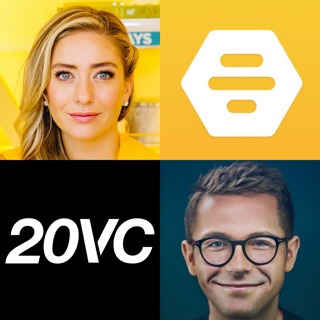
20VC: Bumble's Whitney Wolfe Herd on How The Best Leaders Manage Intense Pressure, How To Think Through Risk vs Reward Frameworks & What it Truly Means to Listen so Your Teams Will Talk
Whitney Wolfe Herd is the Founder and CEO @ Bumble, changing the way people date, find friends, and the perception of meeting online, for the better. Women make the first move. Over an incredible 6 year journey, Whitney has scaled Bumble to a community of over 100 million across six continents. Bumble has facilitated an incredible 1.8 billion first moves as of 2021 and so many more by now. Prior to founding Bumble, Whitney was the Co-Founder and VP of Marketing @ Tinder. In Todays Episode with Whitney Wolfe Herd We Discuss: 1.) Founding Bumble: How Whitney made her way into the world of startups with her co-founding Tinder? What happened when Whitney left Tinder in a very public way? How did that and the scrutiny that came with it, impact her? How did she change? 2.) CEOship 101: What does "High Performance" mean to Whitney? What are the biggest benefits and biggest downside of transparency? What are the few things that as a leader, you cannot be transparent about them? What does it mean to truly listen as a leader? What are the biggest mistakes leaders make when it comes to listening? 3.) Risk and Pressure in Leadership: What is the single moment of highest pressure Whitney has been through in the Bumble journey? How does Whitney deal with pressure as a leader today? How has that changed? How does Whitney approach risk as a leader today? What is too risky? How does Whitney think through her own decision-making framework? 4.) Whitney: The Mother and Wife What does Whitney believe makes a truly successful marriage? How does Whitney not lose an inch of performance as a public markets CEO and also be an amazing mother to two children under the age of 2? What does Whitney know now that she wishes she had known when she started Bumble? As a leader and mother, what gets easier with time, what gets harder? Items Mentioned in Today's Episode with Whitney: Whitney's Favourite Book: Shantaram
26 Aug 202239min
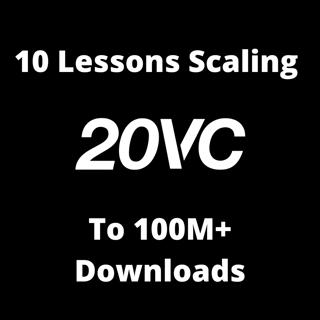
20VC: 10 Lessons on Scaling 20VC to 100M+ Downloads | How To Build an Audience and a Next-Generation Media Company
Over the last 7 years, I have scaled 20VC to 100M+ downloads, and listeners in 117 countries, and all of this with a spend of less than $1,000. Here are 10 of my biggest lessons: Lesson 1: Persistence: This is a game of who can last the longest. Lesson 2: Platform Selection: Choose the platform that best aligns to your skills and passion, not the one that is "hottest" at the time. Lesson 3: Just Start: The biggest reason people fail is because they do not take the first step. The V1 will never be perfect but it will improve. Press publish. Lesson 4: Consistency: You have to create a habit within your audience. You have to let them know when they should expect your content. This will also creating a forcing function for you to stick to. Lesson 5: Be Targeted on your Content Topic: Do not be vague. You have to be very specific in the topic you choose. Start very niche. Find your 100 true fans. Expand from there. Lesson 6: Every Piece of Content is Born Multi-Channel: You do a talk. This is not a single talk. This can be turned into a podcast. Several TikToks. A medium piece. No content is in isolation. Lesson 7: The Right Ratio Between Creation and Distribution: Do not create content and then press publish and think the work ends there. You have to spend the same amount of time distributing the content as you do creating it. Lesson 8: Create Champions: In the early days it is all about finding your 100 true fans. DM people that follow you. Make them feel special. They will retain and tell their friends. Create champions. Lesson 9: Bring People Into the Creation Process: When people feel a part of the creation of content, they will share it actively. Make more people feel part of the creation process. Lesson 10: Each Channel is Different, Optimise for Them: Different channels require different content types, formats, audio, optimise on a per channel basis.
24 Aug 202218min

20VC: Why Market Always Wins Over the Founder & Why I Do Not Do Market Sizing | Why it is not the Best Time to be Investing but it is the Best Time to Have a Fund & The Type of Deals to do Today | Why The Best Founders Have 100 Year Plans with Wes Chan, C
Wes Chan is the Co-Founder and Managing Partner at FPV Ventures, a $450M early-stage fund, launched earlier this year. Wes is an investor in five $10B+ "decacorns," his most notable being Canva where he is a member of the board of directors and led the Series A and C rounds. Wes also wrote the first or very early check into Plaid, Flexport, Gusto, Lucid, and RobinHood. Before FPV Wes was a Managing Director at Felicis Ventures and before Felicis Wes founded GV's seed investing program. If that was not enough, as an operator, Wes co-founded Google Analytics and Google Voice and holds 18 US patents for his work in creating Google AdWords. In Today's Episode with Wes Chan 1.) From Founding Google Analytics to Venture: How did Wes make his way from founding Google Voice and Google Analytics to starting GV's seed investing program? What are 1-2 of the single biggest product takeaways from working closely with Larry and Sergey @ Google? How did Wes make his way from Google to Felicis and scaling the firm with Aydin Senkut? 2.) Market vs Founder: Why Market Sizing is BS: Why does Wes believe that the market always wins over the founder? That said, what does Wes mean when he says "the best founders have 100 year plans?" How does Wes question and analyse 100 year plans? What makes the best? What makes the worst? Why does Wes not do market sizing? Why does Wes not do outcome scenario planning? What does Wes believe is the biggest fallacy of outcome scenario planning? 3.) The Venture Landscape: Does Wes believe that now is really the best time to be investing? Why does Wes believe there are some treacherous deals being done now? What are the signs that these deals are challenging? What advice does Wes give founders fundraising in these markets? What does Wes believe are elements that traditional VCs decide to do, which prevents founders from choosing to work with them? Does Wes believe VCs on board truly provide value? If so, which ones and why them? 4.) FPV: Firm Building and Portfolio Construction: With the new $450M fund, what is the portfolio construction that Wes chose? Why does Wes prefer to have more lines in the portfolio than a concentrated portfolio? Does Wes believe you can increase your ownership in your best companies over time? How does Wes think about capital concentration on a per company basis? What have been Wes' biggest lessons from his biggest hits and misses? Items Mentioned in Todays Episode: Wes' Favourite Book: Liar's Poker
22 Aug 202248min
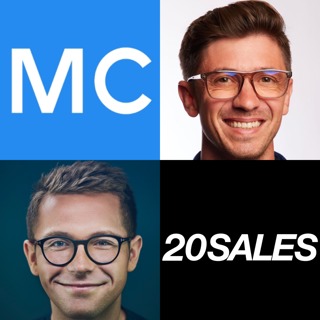
20 Sales: Three Reasons Why Sales People Fail | The Two Things That Matter When Hiring Sales Leaders | Why Revenue, Discounting and Price Do Not Matter in the Early Days with Jordan Van Horn, Revenue Leader @ Monte Carlo
Jordan Van Horn is a Revenue Leader @ Monte Carlo, the world's first data observability company. Prior to this role, Jordan spent an incredible 4 years in sales at Segment including as VP of Sales leading a sales team of 50+ Account Executives and leading the first international expansion for the company into Dublin. Before Segment, Jordan was at Dropbox for 4 years leading enterprise sales for Dropbox Business in California. In Today's Episode with Jordan Van Horn We Discuss: 1.) Entry into the World of Sales: How did Jordan make his way into the world of sales first with a vineyard? What are 1-2 of the biggest takeaways for Jordan from seeing the scaling sales teams at both Segment and Dropbox? How did seeing that impact his mindset? What does Jordan know now that he wishes he had known when he entered sales? 2.) The Sales Playbook: How does Jordan define "the sales playbook"? What is it not? What five core things should the sales playbook help you accomplish? Should the founder be responsible for the sales playbook? Can it be created by a Head of Sales? How does Jordan advise founders on three signals that now is the right time to bring in a sales hire? How does Jordan advise founders on whether the first sales hire should be a rep or a leader? 3.) The Secrets to Pricing and Discounting: Why does Jordan not care what price customers pay in the early days? If it is not about ARR, what should teams be optimizing for? When does price discipline become important in a company journey? What are the dangers of not having price discipline? What two tools do sales leaders have to use in order to create urgency in a deal closing process? How should sales leaders think about building multiple champions within a potential customer? At what price point is it worth it? 4.) The Hiring Process: How does Jordan structure the hiring process for all new sales hires? What are the must-ask questions that Jordan asks all new candidates? What does he want to see in those answers? Who else does he bring into the hiring process? At what stage do they get involved? What are they testing for? Does Jordan use case studies with candidates? What makes the best? What makes the worst? 5.) The Onboarding: What is the ideal onboarding process for new sales reps? What should founders do and prep for when onboarding their first sales hires? What materials and recordings should they have ready? What are some early signs that a new hire is not working out? How do we measure their impact? For enterprise sales, it takes a long time to close new deals, how can one determine effectiveness of new reps when the sales cycle is so long?
17 Aug 202254min
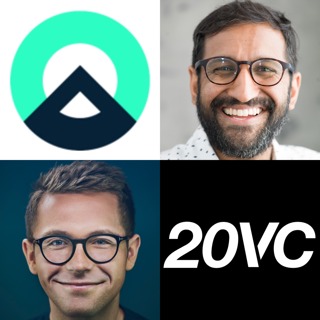
20VC: Fintech OG Sheel Mohnot on Lessons from Investing in Flexport and ChipperCash and Missing Robinhood and Chime, Why Overly Large GP Commits are Dangerous, Biggest Mistakes Managers Make with Fund I and Emerging Markets; Which Survive?
Sheel Mohnot is a Co-Founder and General Partner @ Better Tomorrow Ventures, a $225M fund that leads rounds in pre-seed and seed-stage fintech companies globally. Sheel and Jake (his co-founder) invested for many years together before founding BTV and wrote checks into Mercury, Flexport, Ramp, and Hippo Insurance to name a few. As for Sheel, before BTV he ran 500 Fintech for close to 7 years, and before that was a founder, founding two companies, both of which were acquired. If that was not enough, Sheel is also a master at measuring the width of swimming pools and making cameo appearances in music videos with Justin Bieber. In Todays Episode with Sheel Mohnot We Discuss: 1.) Entry into Venture: How Sheel made his way into the world of venture having founded 2 fintech companies? Why did no LPs give Sheel money in the early 500 Fintech days? What were some of his biggest lessons from investing in 100s of companies with 500 Fintech? How did BTV with Jake come together most recently? What are the biggest differences to Sheel of being a fund manager vs being an investor? 2.) The Power Law: How does Sheel define "the power law" in venture capital? What multiple of return would be power law status? Given the size of outcome available with these power law returns, how does Sheel approach portfolio construction? Would it not be best to invest in 100s of companies? Who does Sheel believe has done the indexing approach best? Why? 3.) Venture Capital has Never Been Less Collaborative: Why does Sheel disagree with Harry that venture capital has never been less collaborative? Why now, for the first time, are large multi-stage funds taking single-digit ownership? Does Sheel agree with Harry it is moronic to have "guaranteed pro-rata"? How does Sheel approach re-investment decision-making? When does he pay up vs not? 4.) The Biggest Wins and Misses: What have been Sheel's biggest wins from a cashback and a multiple perspective? How did Sheel miss the chance to invest in both Robinhood and Chime early on? What did he not see? How would he have thought differently with the benefit of hindsight? How have Sheel's biggest hits and misses impacted how he invests today? 5.) Emerging and Frontier Markets: Does Sheel share Harry's concern for the removal of capital from emerging markets? Why does Sheel believe that India, South East Asia and LATAM will be fine? Why does Sheel believe Pakistan and Africa are most in trouble? What advice does Sheel give to his emerging markets founders today? Items Mentioned in Today's Episode: Sheel's Favourite Book: Enders Game
15 Aug 202243min

20VC: 13 of the Great Investing Minds on When to Pay Up vs When To Remain Disciplined and Walk Because the Price is too High: The Ultimate Guide to Price Sensitivity
Marcelo Claure is an entrepreneur and investor who has founded and led some of the world's most iconic businesses. He is currently the Chairman & CEO of Claure Capital, a newly founded multi-billion-dollar global investment firm. Before this, Marcelo was COO @ Softbank Group, the world's largest technology investment company. Bill Gurley is a General Partner @ Benchmark, one of the most successful funds of the last decade with a portfolio including Uber, Twitter, Dropbox, Modern Treasury, Snapchat, StitchFix, and many more. Michael Eisenberg spent 15 years as a General Partner @ Benchmark working alongside Bill and the Benchmark partnership. Following Benchmark, Michael co-founded Aleph, one of the leading Israeli venture funds of the last decade. David Tisch is the Founder and Managing Partner @ Box Group, one of the leading seed focused firms of the last decade with a portfolio including Airtable, Glossier, PillPack, Plaid and many more. Cyan Banister is one of the most successful and renowned early-stage investors in the last decade. Her portfolio includes the likes of SpaceX, Uber, Affirm, Opendoor Postmates, Niantic and Thumbtack to name a few. Zach Weinberg is a Co-Founder of Operator Partners, operators funding operators, with no outside LPs, just their own capital. Luciana Lixandru is a Partner @ Sequoia, one of the world's most renowned and successful venture firms with Sequoia-backed companies accounting for more than 20% of NASDAQ's total value. Jeff Lieberman is the Managing Director @ Insight Partners, one of the leading investing franchises of the last 25 years with their most recent flagship fund announced earlier this year being a staggering $20BN. Nick Shalek is a General Partner @ Ribbit Capital, specializing in fintech they are one of the most successful venture firms of the last decade with a portfolio including Robinhood, Coinbase, Revolut, Nubank and more. Frank Rotman is a founding partner of QED Investors, one of the leading fintech-focused venture firms investing today with a portfolio including the likes of Klarna, Kavak, Quinto Andar, Credit Karma and more. Geoff Lewis is the Founder and Managing Partner @ Bedrock, now with over $1BN in AUM, Bedrock invests in breakout technology companies that are incongruent with popular narratives. Justin Fishner-Wolfson is founder and the managing partner of 137 Ventures. Their portfolio includes SpaceX, Wish, Anduril, Flexport, and WorkRise (formerly Rigup) to name a few. David Sze is a General Partner @ Greylock where he has led some of the firms most notable investments including Facebook, LinkedIn and Pandora. In Today's Episode We Discuss Price Sensitivity: 1.) How do you assess your relationship to price and price sensitivity? 2.) When is the time to pay up and have less price discipline? 3.) When should we remain disciplined and not pay up for a deal and walk away because of price? 4.) Of the deals you have paid up for, did their growth rate justify the high entry price? 5.) Knowing all you know now on price, how do you advise younger investors today?
12 Aug 202228min
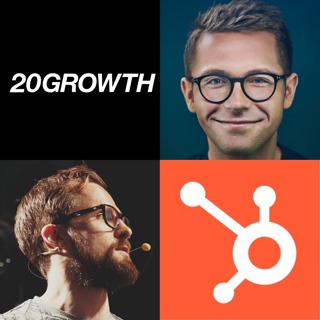
20 Growth: Why You Need a Growth Hire Pre Product-Market-Fit? Why Every Company Will Be a Media Company and How To Do It | Communities; What Really Are They? How To Build Them? What Makes The Best? Why Do Many Not Work? | Kieran Flanagan, SVP Marketing @
Kieran Flanagan is SVP Marketing at HubSpot, where he has helped the business grow internationally, move to a product-led business, quadrupled its marketing demand, and built out its media team, including the acquisition of 'The Hustle.' He is also an advisor and investor in early-stage companies. In Today's Episode with Kieran Flanagan We Discuss: 1.) Entry into Growth and Marketing: How did Kieran make his way into the world of growth and marketing? What has been 1-2 of Kieran's biggest lessons from seeing firsthand the hyper-scaling of Hubspot? On reflection, how would Kieran summarise both Hubspot's community building attempts and also their product messaging? 2.) Why You Need Growth Hires Pre Product Market Fit: What does "growth" mean to Kieran? Where do so many get it wrong? Why does Kieran believe that you should have a growth team/people before product market fit? What specifically do they do and work on during this stage? Pre PMF, what is the core metric that all startups should focus on? How does it change with time? 3.) Building Your Growth Team: What does Kieran believe are the 3 key stages to hiring for growth? How should founders determine whether to have external standalone growth teams or integrate them into existing functions? What are the single biggest mistakes founders make when hiring for growth? 4.) The Future is Content: Why does Kieran believe every great tech brand will have to become a media brand? Why is Elon Musk an example of the perfect brand? What has he done right? Why does Kieran say that data is the best and worst thing that has happened to marketing? 5.) WTF Really is Community: How does Kieran define "community"? What is it? What is it not? What makes the best communities? Why do some work and others not? Should every company have a community approach? Who does it make sense for? Have Hubspot done a good job at community building? On reflection, is there anything that Kieran would have done differently?
10 Aug 202254min






















